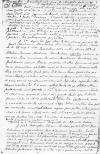Letter #438
Sigismund II Augustus Jagiellon to Ioannes DANTISCUSCracow (Kraków), 1548-08-13
Manuscript sources:
| ||||||
Text & apparatus & commentary Plain text Text & commentary Text & apparatus Excerpts concerning Dantiscus' travels
 B. PAU-PAN, 8244 (TK 6), a.1548, f. 9
B. PAU-PAN, 8244 (TK 6), a.1548, f. 9
List
